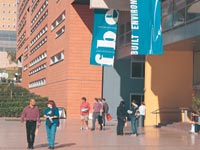| Urban Development and Design - 8131 |
|
||||||||||||||||||||||||||||||||||||||||
|
Program Summary
A one calendar year (three sessions) full-time or two calendar year (five sessions) part-time multi-disciplinary coursework program for a wide range of graduates from both design and non-design based disciplines with both Session 1 and Session 2 intake. An advanced study program examines the crucial relationship between urban development and design from an international perspective, but with particular reference to the rapidly developing Asia-Pacific region. The intensive one calendar year program involves two academic sessions of study plus a summer term and includes a compulsory field project based in a major South East Asian city. Graduates of the program from a planning-related background are eligible for membership of the Planning Institute of Australia (PIA). Students from a non-planning-related background may elect to take an additional 24 units of credit of approved planning courses to become eligible for PIA membership.
Program Objectives and Learning Outcomes Please contact the Faculty of the Built Environment for information regarding the Program Objectives and Learning Outcomes.
The content of the program is progressive, stressing theoretical knowledge of economic, social, environmental and physical design determinants at the beginning, and moving into more applied skills and applications toward the end of the year. The nature of contribution to studio-based design projects will be determined according to academic and professional background.
To qualify for the Master of Urban Development degree, students are required to complete ten core and two elective courses to accumulate a total of 72 UOC. The compulsory core includes five lecture/seminar based courses, three project based studio courses, and a case study course. The typical pattern for core and elective courses will be a two hour lecture/seminar format over 12 weeks, i.e. a total of 24 hours per session. Students are encouraged to select electives from those listed below which have been specifically selected for the program. However students may be permitted, with the approval of the Program Director, to select electives from other programs offered within the faculty or other faculties of the University. The Summer Term will include case studies of major urban projects, the South East Asian field project, and the preparation of the annual exhibition and publication. Program of Study for Full-time Candidates: Session 1 Electives 6 UOC
Session 2
Electives 6 UOC
Summer Term Recommended Program of Study for Part-time Candidates:
Year 1 Session 1 Session 2
Elective 6 UOC
Year 2 Session 1
Electives 6 UOC
Session 2
Summer Term
Recommended Elective Courses
Additional PIA Accreditation Study Program
Electives (approved Planning courses) 12 UOC
Note: Most elective courses are offered in only one session per year. Some courses may not be offered every year. Additional electives may also be offered in a particular session. Students are advised to contact the Program Director prior to enrolment for information about the availability of courses in a particular session. Admission Requirements
Admission to the program is available to a wide range of graduates in both design and non-design based disciplines. The minimum requirement is a four year undergraduate degree in fields such as architecture, landscape architecture, urban planning, urban studies, real estate economics, property development, or another appropriate discipline. In exceptional cases students may be admitted on the basis of professional experience. Applicants who do not meet these requirements may be permitted to gain admission via a qualifying program. Fees This is a full fee paying program for both local and international students. The South-East Asian field project costs are in addition to fees. Contact the Program Director for details. For information regarding fees for UNSW programs, please refer to the following web-page: https://my.unsw.edu.au/student/fees/FeesMainPage.html
|
|||||||||||||||||||||||||||||||||||||||||

| Contacts | Library | myUNSW | WebCT |
